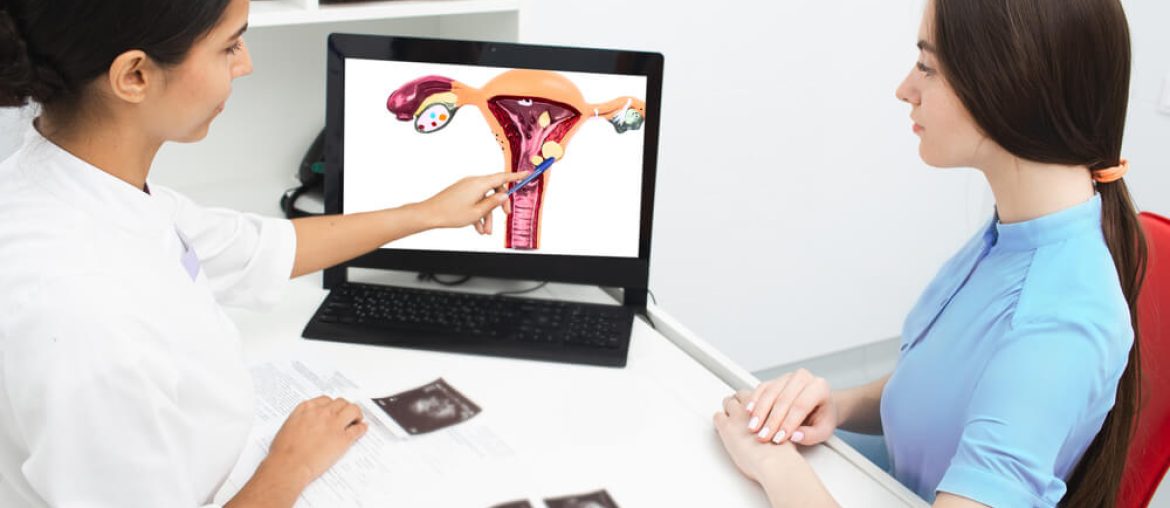Fibroids are most often found during a routine pelvic exam, and while most don’t present any symptoms, painful fibroids can interfere with your menstrual cycle and chances for pregnancy. For those facing painful fibroids, our May-Grant OB/GYN team can provide fibroid treatment and help alleviate your symptoms.
What are Fibroids?
Fibroids are benign, noncancerous growths that appear along the uterus. Fibroids can range in size and shape, often appearing during childbearing years. There are three types of fibroids:
- Intramural Fibroids: Intramural fibroids appear inside the muscular uterine wall
- Submucosal Fibroids: Submucosal fibroids appear inside the uterine wall, building into the uterine cavity.
- Subserosal Fibroids: Subserosal fibroids originate inside the uterine wall and project outside the uterus.
Fibroids are not associated with an increased risk of cancer, and the current causes of fibroids are unknown. Many women with fibroids don’t experience any symptoms. Still, some fibroids can cause symptoms depending on their location, causing heavy menstrual bleeding, longer menstrual cycles, pelvic pressure, urinary incontinence, and constipation.
While fibroids don’t usually cause complications, fibroids can cause intense discomfort. With submucosal fibroids, infertility, pregnancy loss, and other pregnancy complications are possible due to the blocking of the uterine opening. When diagnosing uterine fibroids, our team can find them during a pelvic exam, diagnostic imaging, and ultrasound to confirm your diagnosis.
Why Fibroid Treatment is Necessary
Effective management of fibroids is essential to:
- Alleviate painful symptoms and discomfort
- Prevent complications such as anemia from heavy blood loss
- Preserve fertility and improve pregnancy outcomes for those seeking to conceive
- Enhance quality of life
Treatment Options For Fibroids at May-Grant OB/GYN
If you have uterine fibroids or during your pelvic exam and our physicians have diagnosed fibroids, then our team can provide treatment options for your fibroids depending on your symptoms and prevent future complications. Our treatment options for fibroids include the following:
- Watchful Waiting: Fibroids that don’t cause any symptoms will need monitoring to track changes in your cycle.
- Hormonal Contraceptives: Birth control pills and intrauterine devices can help prevent ovulation, reducing the flow of heavy periods and controlling pain related to fibroids.
- Hormone Therapy: Some hormone therapies, including gonadotropin-releasing hormone agonists, can help shrink fibroids down over time and help prevent them from recurring.
- Surgery Recommendations: Surgery in most cases may be recommended for painful, large fibroids. Our team can provide referrals to qualified surgeons in the area to perform procedures that can treat large fibroids, including:
- Myomectomy Surgery: Myomectomy can surgically remove fibroids without affecting fertility.
- Minimally Invasive Laparoscopic Surgery: Another highly recommended surgery, laparoscopic surgery, can be performed through minimally invasive techniques to remove the fibroids effectively.

Prevention and Education
While the exact cause of fibroids is still unknown and prevention may not always be possible, our team focuses on educating patients about recognizing symptoms early and seeking prompt medical attention.
Outlook
With appropriate treatment, most women with fibroids can manage their symptoms effectively and maintain a good quality of life. Our team at May-Grant OB/GYN is committed to providing the latest treatments and support for women dealing with fibroids.
Frequently Asked Questions
Q: Are fibroids cancerous?
A: No, fibroids are benign (non-cancerous) growths. However, it’s important to monitor them due to the potential for discomfort and other health issues.
Q: Can fibroids affect my ability to get pregnant?
A: Depending on their size and location, fibroids can sometimes affect fertility. Individual evaluations are necessary to determine the best course of action.
Q: What are the treatment options if I want to preserve my fertility?
A: Treatments such as medication or myomectomy can manage symptoms and preserve fertility. Our team will work with you to choose the best option.
Q: How do I know if my fibroids are growing?
A: Regular monitoring through pelvic exams and imaging tests can track fibroid growth. We recommend following up with your provider if symptoms worsen.
Take Control of Your Health with May-Grant OB/GYN
At May-Grant OB/GYN, our team can provide regular pelvic exams if you regularly suffer from fibroids. Our team of midwives, nurse practitioners, and physicians can help diagnose and provide treatment for fibroids through our in-house treatments, including ultrasounds, laboratory tests, and other methods to improve your well-being. As a practice operating for over 50 years, we have five locations across the Lancaster, PA, with extended early morning, evening, and Saturday hours to serve our communities. Contact May-Grant OB/GYN today or call 717-397-8177 to schedule an appointment in person or online.


















